Welcome to the Demolition Derby, Maine's Smashing, Small-Town Sporting Event
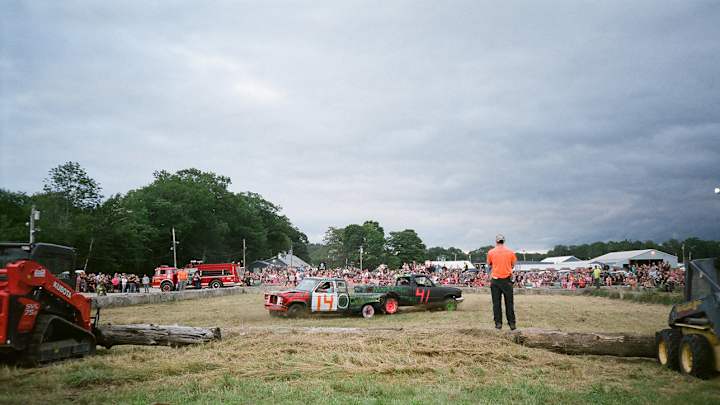
Two years ago at the Windsor State Fair, Joey Werner entered his first demolition derby by chance.
If you aren’t familiar, here’s how “demo derbies” at Maine agricultural fairs work: People haul old cars out of junkyards and strip them of seats, glass, airbags, door handles and sun visors—the things that make a car a car and not just a tin can on wheels—and then smash them into each other in front of a crowd. Anywhere from three to 15 cars at a time drive into a makeshift arena blocked off by concrete barriers. The last vehicle working wins the heat and goes on to the final feature event, where the crumpled, crippled machines fight each other with whatever last gasps of life they have left. They crash until all but one can still move under its own power. The driver of the last survivor is crowned the winner.
He wasn’t planning on competing, but on that late August night, Werner, a snow plow mechanic, won the fair’s raffle for a car and entry into the derby. He watched as two of the cars in the heat before his collided. The momentum sent one up and over the other, crushing the roof above its empty passenger side seat. Smoke poured from the hood, and Werner could see flames licking at the asphalt beneath the car’s undercarriage.
He sat there thinking, “I’m gonna die tonight.”
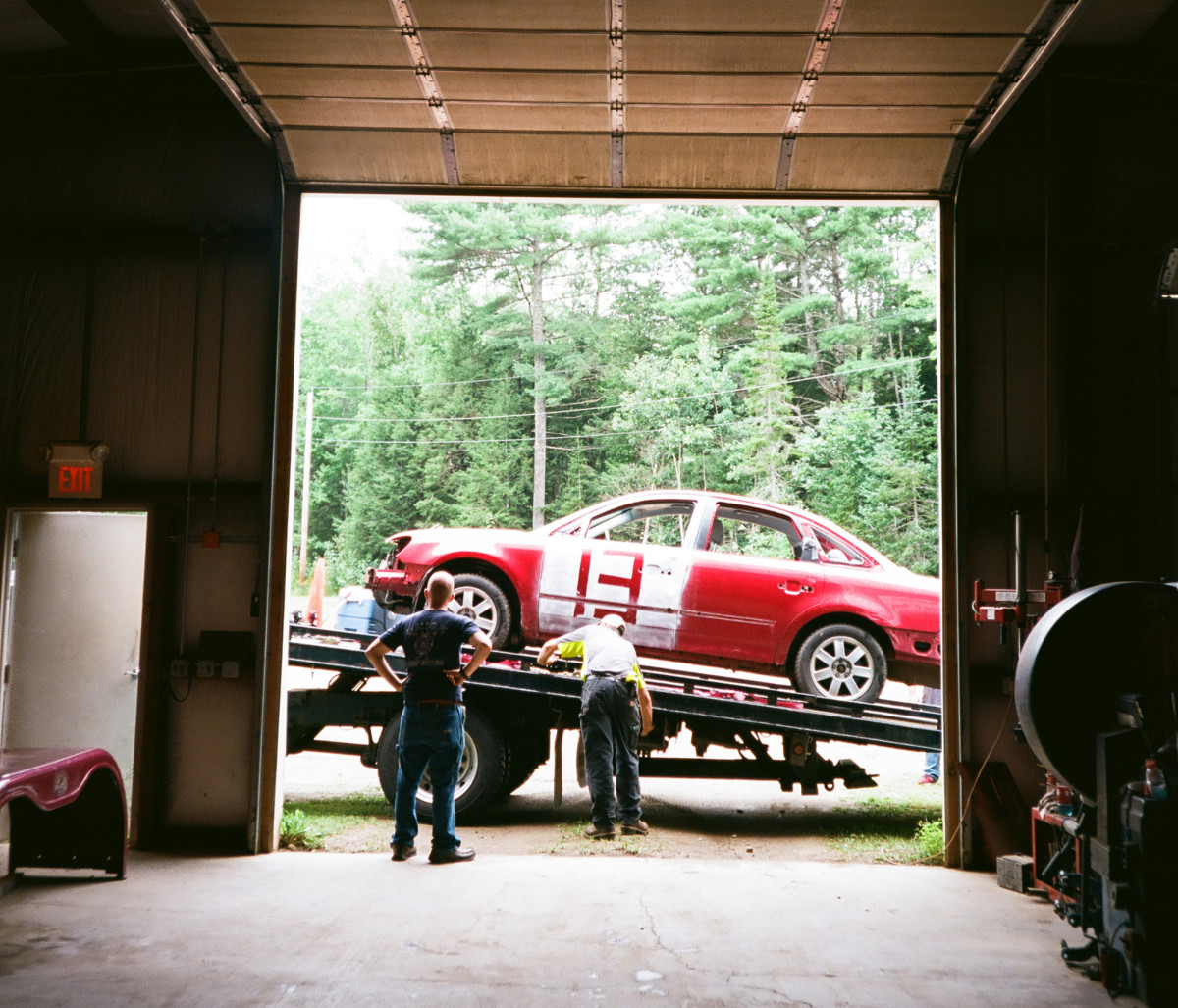
Jacoby Leavitt operates HomeTown Towing, his auto repair and towing service, out of a big blue garage that sits at the end of Down Back Drive in Jefferson, Maine. The dirt road doesn’t show up on Google Maps, so if you’re coming from the coast, take Route 90 to 17 to 220 to 126, and then turn left after that big bend in the road streaked with tire marks. If Leavitt isn’t around, there will be a sign hanging on the side door that says I AM OUT ON A TOW CALL. If he hasn’t been called away, the doors of the cavernous metal shed will be open, and you’ll see him inside working on a truck that broke down, or a car or motorcycle he hauled out of a ditch after an accident. He’s one of the only guys in the area who knows how to fix flatbeds trucks used to haul lumber, so business has been steady since he opened the shop in 2017.
But on Friday, August 17, Leavitt isn’t making any money. In fact, he’s losing it. The Union Fair starts in a day, and Leavitt has closed the shop to customers. He’s busy preparing junkyard cars for his friends to bash into each other in the arena tomorrow night. By the time I get there at 10 a.m., he’s already finished three vehicles, and he’s starting in on an old Ford Taurus for Werner to drive.
Werner, a short, hefty guy with a wide smile and a calming Maine lilt (which can best be described as a mashup of Boston, Southern U.S. and Australian accents), is Leavitt’s best friend. Werner used to be married to Leavitt’s sister. Things didn’t work out, so now he’s married to a woman named Shelley who sells insurance. They live up on Mountain Road, which everyone in town refers to as The Mountain (it’s really a hill), with Shelley’s two kids.
Clearly, Werner didn’t die that night at the Windsor Fair. He came in third, and has since entered a few more demo derbies. He’s never won, though; his best finish is second. “The first loser,” he calls it. He wants this Taurus to be the car that secures him that elusive victory, but he’s not holding his breath. He’s mostly just hoping he won’t get too beat up—three people went to the hospital after Windsor’s derby last year. Leavitt once got crushed so badly by a hit to his driver’s side door that his entire left side was purple for a month.

“You don’t feel it at first, you feel the pains the next day and the week after that,” Leavitt says, as he pulls the Taurus’s upholstered back seats out. “You can have a plan, you can say you’re not going to use your front end to hit people, because that’s where your engine is and you want to protect it. But then you have a chance to take someone out with your front end and you do it. After that first hit, it’s all adrenaline. It’s all about revenge.”
Leavitt and Werner are trying to remove the trailer hitch secured to the back of the Ford, but the 10-millimeter drill bit is missing. Leavitt’s daughters Madison, nine, and Liberty, six, and his son Jacoby Jr., four, are playing with a dirty old glove embroidered with the Patriots logo. As he looks for the bit, Leavitt tells his kids to quit throwing the glove at each other or he’ll make their grandmother come get them. Alison, Leavitt’s wife and the mother of his children, is at the hospital where she works as a nurse, and daycare is closed today, so all morning the kids have been crashing an old plastic car into the shop’s door and climbing on the heap of tires out behind the garage.
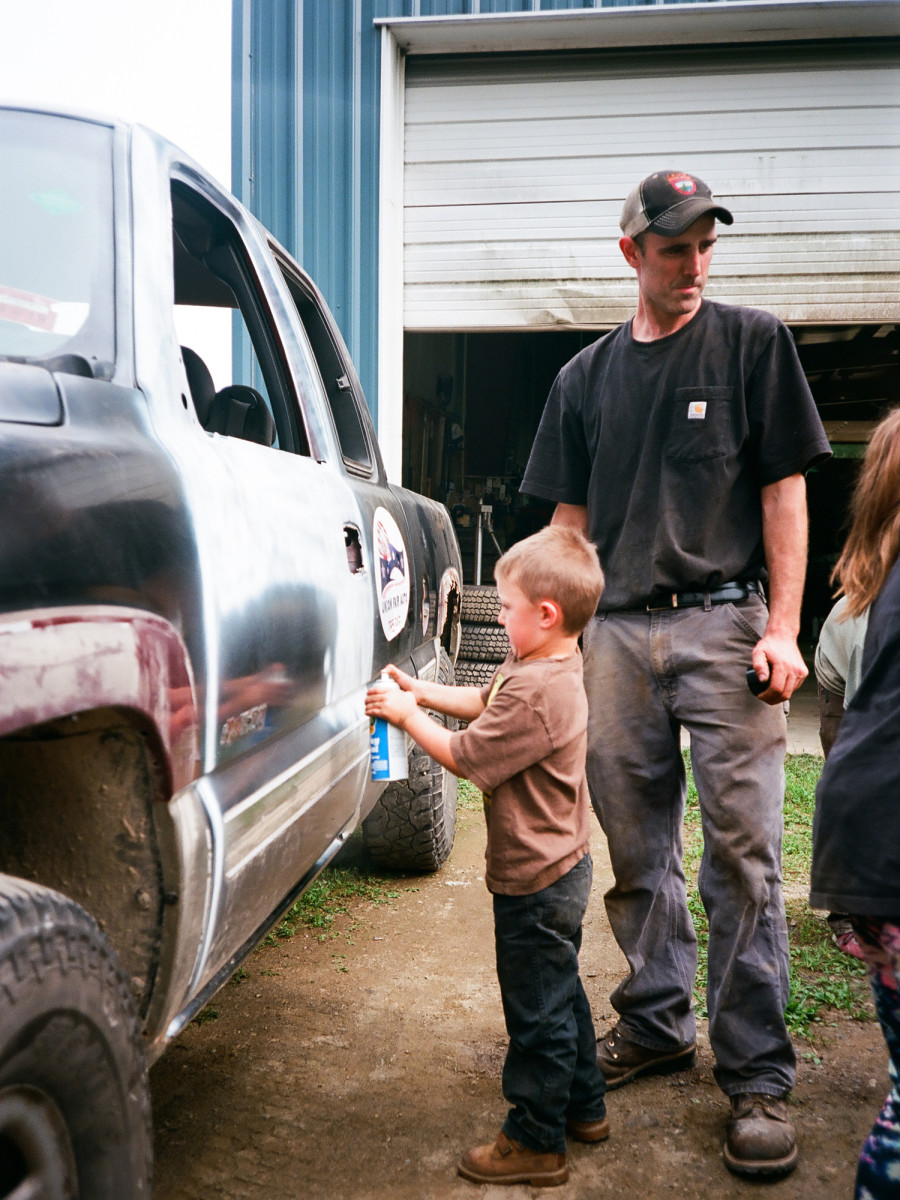
Jacoby Jr. lends a hand with a can of spray paint.
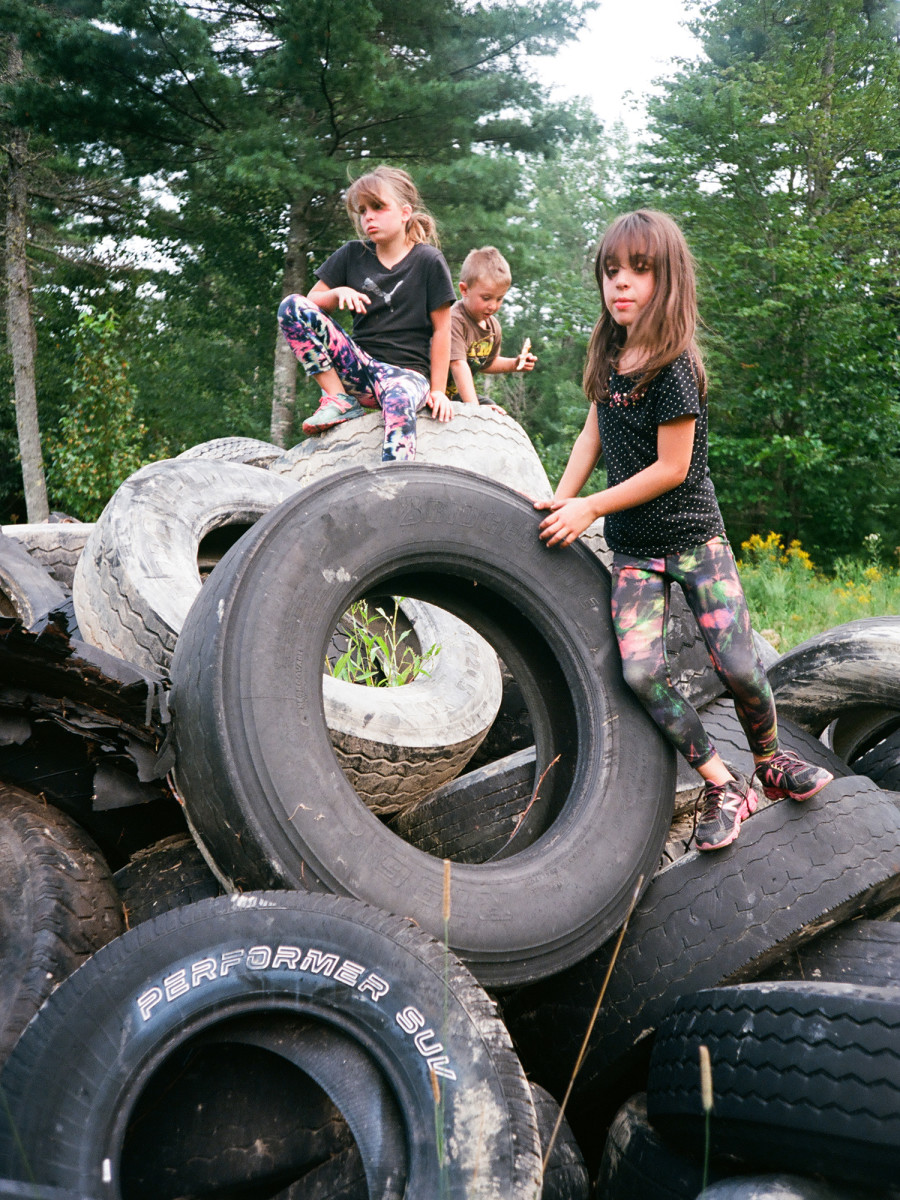
Madison, Jacoby Jr. and Liberty Leavitt (from left) climb on a pile of old tires outside of the garage.
Madison shushes her siblings. Born premature at only two pounds, she’s the Leavitts’ miracle. She approaches the world with skepticism. Liberty and Jacoby Jr. are warm and gregarious. The three kids quiet down at the thought of having to leave; they know more of their dad’s friends are going to show up later and they don’t want to miss any of the action. Leavitt finally finds the tool he’s looking for.
“I got 99 problems but the 10 mil ain’t one,” he says, grinning as he begins taking off the offending hunk of metal.
This will be the first year Leavitt hasn’t driven in the Union Fair demo derby since he was 17, because he’s in charge of running it. His friend Scooter Chadbourne used to be the organizer, but he got a new job and moved to New Hampshire. Leavitt grew up in this small, rural town about four hours north of Boston, where the average household income hovers around $40,000 and most residents work in the service or logging industry. It’s only a 30-mile drive to the coast, but Lincoln County couldn’t be farther away from extreme wealth of the summer community along the water, where Martha Stewart, John Travolta, the Bush family, hedge fund managers and families who come up from Boston or New York to spend the summer.
Both of my grandmothers live on the coast, in Rockport, and my parents met there. I grew up outside of Boston but spent summers in Maine. When I was Madison’s age, I looked forward to the Union fair the way most kids wait for Christmas. My dad and uncle would take my cousins and me on the Ferris wheel, which is still in operation and cannot be safe anymore (if it ever was). We’d get lost in the house of mirrors, throw darts at balloons to win stuffed animals and eat cotton candy until we got sick. It was heaven.
In 2006, when I was a teenager, my local friends who lived year-round in the area took me to the demolition derby for the first time. A few competed; they got some rusted-up old cars and spray painted GIT ER DONE on the side. We all went to cheer them on, and I was fascinated. I’d never seen anything like it—terrible and violent and beautiful and completely foreign to me. But there was something compelling and alluring about it, almost sexy. I wanted to understand. Who gets into a series of repeated car accidents on purpose? Why?
So as an adult, I came back to find out.
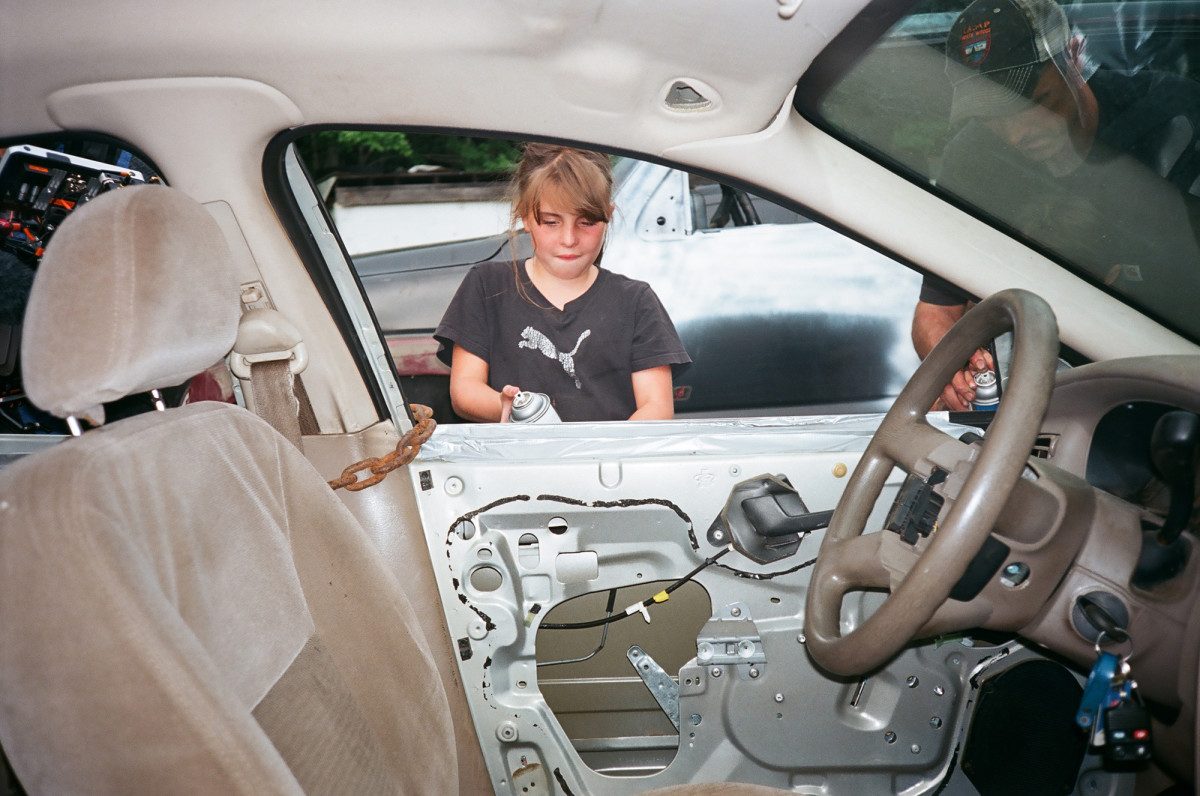
Leavitt was accepted to the NASCAR Technical Institute out of high school but decided to stick around and work at a used car dealership after he graduated in 2004. He loves his family and his business. But sometimes he can’t help wonder what his life would’ve been like if he’d ventured down to North Carolina to learn the intricate mechanics of fixing 40 million dollar cars instead of flatbeds. Or standing in the pits of a NASCAR race instead of volunteering with the local fire department, which he’s done since he was 15. He’s had to cut people out of cars, drag kids from burning buildings, watch people die. He’s as tall and thin as he was when he started, but he looks much older now, older even than his 31 years. A few of his friends who are also firefighters can’t go to the derby. The crashes upset them; they’ve seen the real thing too often.
“It stays with you,” Leavitt says, sawing at the Taurus’s bumper with a hacksaw. “You try not to think about it, but sometimes you can’t help it.”
Sparks fly, then he rips the bumper the rest of the way off with his hands. He’s stripping the car the way he guts a deer. Leavitt loves to hunt, and this year he finally got approved for a moose license. It’s almost surgical, the way he pulls out wires like they were intestines, strips the plastic off the doors as though it were the skin covering a dead animal’s muscles.
Werner looks on.
“It’s fun,” he says, grinning. “Normally, working with a car, you have to be careful. But with this, you just get to rip it apart.”
Madison wanders outside. She runs her fingers over the jagged metal where her father has cut a hole in the hood of one of the cars. Each one must have a vent so that smoke can escape in case the engine goes up in flames.
The fires, the noise, the violence of the derby—it frightens Madison. She spent most of last year’s event hiding in the Porta Potty. But she always goes. It intrigues her.
“I think I might want to do it someday, but it’s really scary,” she says. “My daddy hurt his ribs, and when my mama drove in it she thought she was gonna die. Another car drove on top of her and she really thought she was gonna die.”
Liberty and Jacoby Jr. follow Madison as she wanders past the rusted cars and pieces of an 18-wheeler strewn around the field behind her father’s shop. They make their way down to the pond. Every year, Leavitt raffles off a car at the Union Fair. He usually donates the money to March of Dimes. But last year, Leavitt and Alison let Madison decide where the money went. Madison loves animals, so the family donated the proceeds to the local animal shelter and bought dog food for the strays being kept there. Liberty wants to be a nurse like her mom when she grows up, and Jacoby wants to be a firefighter like his dad. Madison wants to save dogs.
The sounds of tires crunching on gravel and the slamming of car doors bounce off the tin siding of the garage. Jacoby and Liberty see that their dad’s friends have arrived and start running back to the house. Madison gets going, then realizes she has a tick crawling up her leg. She picks it off and holds it up close to her face, examining its pincers. She squeezes it but doesn’t kill it, setting it down instead among the tall cattails growing in a ring around the muddy pool of water.
Then she follows the noise and her siblings back to the shop, where her father is carefully preparing cars to be destroyed.
“I bet you it takes her three tries,” Andy Holmes says.
He and five other friends who grew up with Leavitt are sitting on the gate of Leavitt’s truck. I’m standing in front of them, holding a sledgehammer. Leavitt and Werner have been carefully removing the windows from the Taurus—you have to take out all the glass except for the windshield in order to compete—but their buddies are giving them a hard time for being delicate, telling them just to smash them in. Apparently it’s harder to break a car window than I realized, so they’ve handed me this tool and told me to try.
I raise the hammer and Werner stops me.
“Wait,” he says. “Here.”
He gives me his sunglasses. I put them on, then swing at the car a little tentatively. The hammer head bounces off the window.
“See?” says Holmes. “It’ll take two more hits.”
I raise the hammer again and whip it across my body, connecting hard with the glass. The window shatters into thousands of tiny pieces that spray all over the inside of the car and the floor of the garage. A rush of adrenaline surges through me; I want to break all the windows in the world. Then I look down at my hands and see that I’m bleeding.
“Your editors are gonna be like, ‘She can’t hang out with those rednecks up north anymore,’” Holmes jokes.
“Yeah,” says Kenny Doak, a mechanic who works on tugboats. “They’ll be like, ‘Forget Mexico, build the wall in New Hampshire. Make Canada pay for it.’”
The derby is as much about getting ready for it as it is actually doing it. But working on a car is only as fun as the people you’re with, and it’s even more fun when you’re drinking, so by 4 p.m., most of the guys except for Leavitt have cracked beers. Doak and Holmes are reminiscing about last year’s derby. It was around the same time that Holmes, 25, got a divorce, a tattoo of a towing hook that looks like it’s coming out of his arm and a Harley Davidson motorcycle. He has a daughter and his own towing business like Leavitt, but he isn’t operating it right now. His flatbed broke and Leavitt hasn’t had time to fix it yet.
Werner tells Leavitt not to forget to remove the sun visors because it’s in the rule book. But Leavitt already did it—he has the three-page, single-spaced document memorized. In fact, he wrote it. This is seriously organized and inspected chaos. Leavitt wants to be sure it’s the safest possible danger.
Another one of Leavitt’s friends starts a Ford pickup that’s been stripped and gutted. The muffler is off, so the engine roars and the sound echoes off the walls. Madison puts her hands over her ears and runs away. Once, a few years ago, she ran all the way down the driveway to the main road because the noise scared her so much. Sometimes she gets so nervous she feels likes she’s going to throw up.
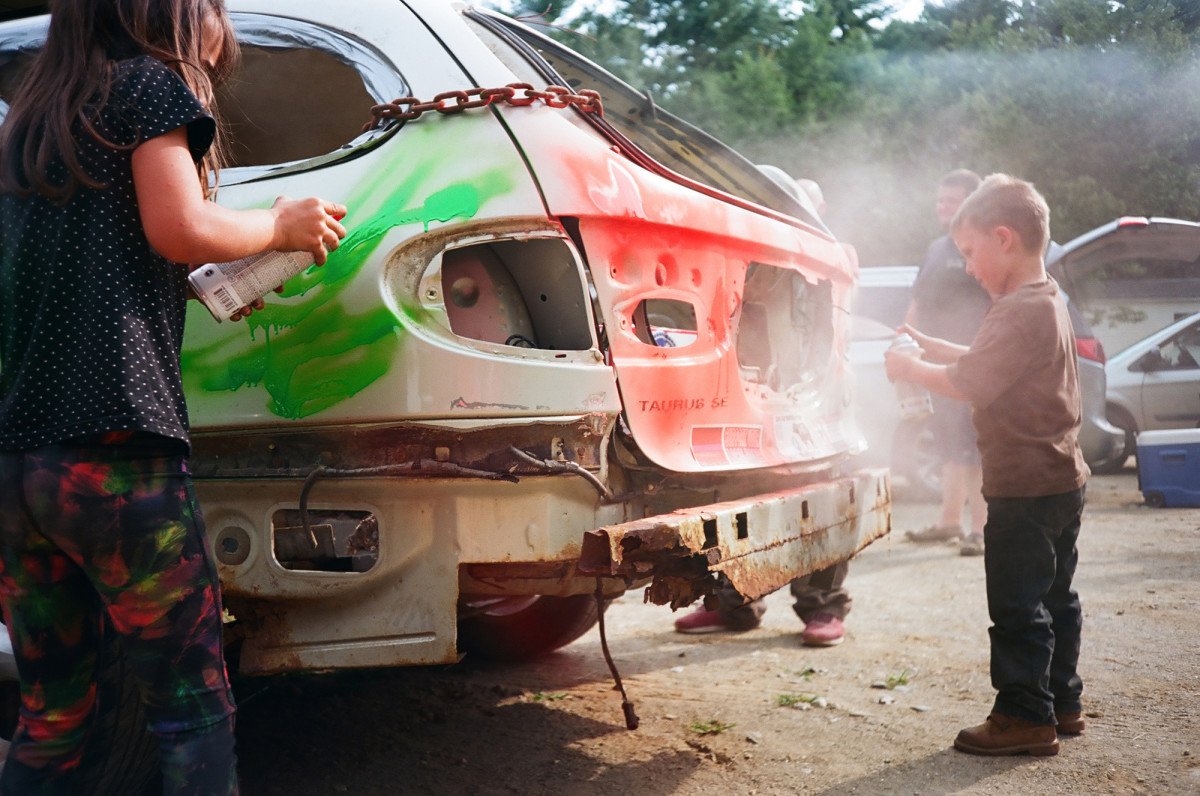
But she’s getting more used to the noise and the derby, and even kind of likes it now. So she comes back into the garage and Leavitt hands her, Jacoby Jr., and Liberty each a can of spray paint. He guides their hands as they turn the silver Taurus’s driver’s side door black. They’ve watched their father do this year after year: You have to mark the door so that other drivers know not to hit you there. A collision with the front left side of a car is when people get seriously hurt. If you’re caught targeting the driver, you’re automatically disqualified.
The spray paint lifts off the car in clouds, surrounding the children and turning them into a faded old photo. Madison doesn’t like school that much but she loves art class—she makes sure she doesn’t miss a spot of the silver metal.
Werner paints a checkered racing flag onto the Ford’s side. They drive it around back, where they’ll load it onto a truck tomorrow morning and cart it out to the fairgrounds.
What no one knows yet is that later, once everyone’s gone home, Leavitt will sneak back into the garage to put a few finishing touches on the Taurus. The modifications won’t be against the rules, but he won’t tell me what they are. You don’t give away secrets like that.
“If you catch on fire twice, you’re done,” Leavitt says.
He’s standing in the middle of a field with all the 40 or so drivers who’ll be competing tonight standing in front of him. It’s 6 p.m.—almost go time. Wearing a bright orange t-shirt that says LEAVITT on the back and STAFF on the front, he’s going over the rules.
“If your vehicle catches on fire, unless the damn thing is going to explode, don’t get out,” he continues. “If your engine is smoking, don’t get out. You’ll get run over. And keep your helmet on. And your hands in the car, Holmeses.”
Leavitt looks at Andy Holmes and Andy’s brother David as he says this. Everyone laughs. One of the brothers almost loses a hand every year because they both drive with their left arms out the window.
All the stripped-down, marked-up cars are parked in four lines of ten behind the semi-circle of drivers. They’re an army of exoskeletons that have passed Leavitt’s careful inspection: All the doors are chained shut, all the glass has been removed, no metal sheets have been added to reinforce sides. But they all have their own personality. The one that David Holmes’s wife, Tiffany, will be driving—a ’98 Buick with a burgundy velvet interior—has been painted pink with her kids’ names written on the side. Another has a Halloween mask attached to the passenger’s side seat and skulls drawn on the hood. The car at the front of this strange metal phalanx flies a pirate flag from its antenna.
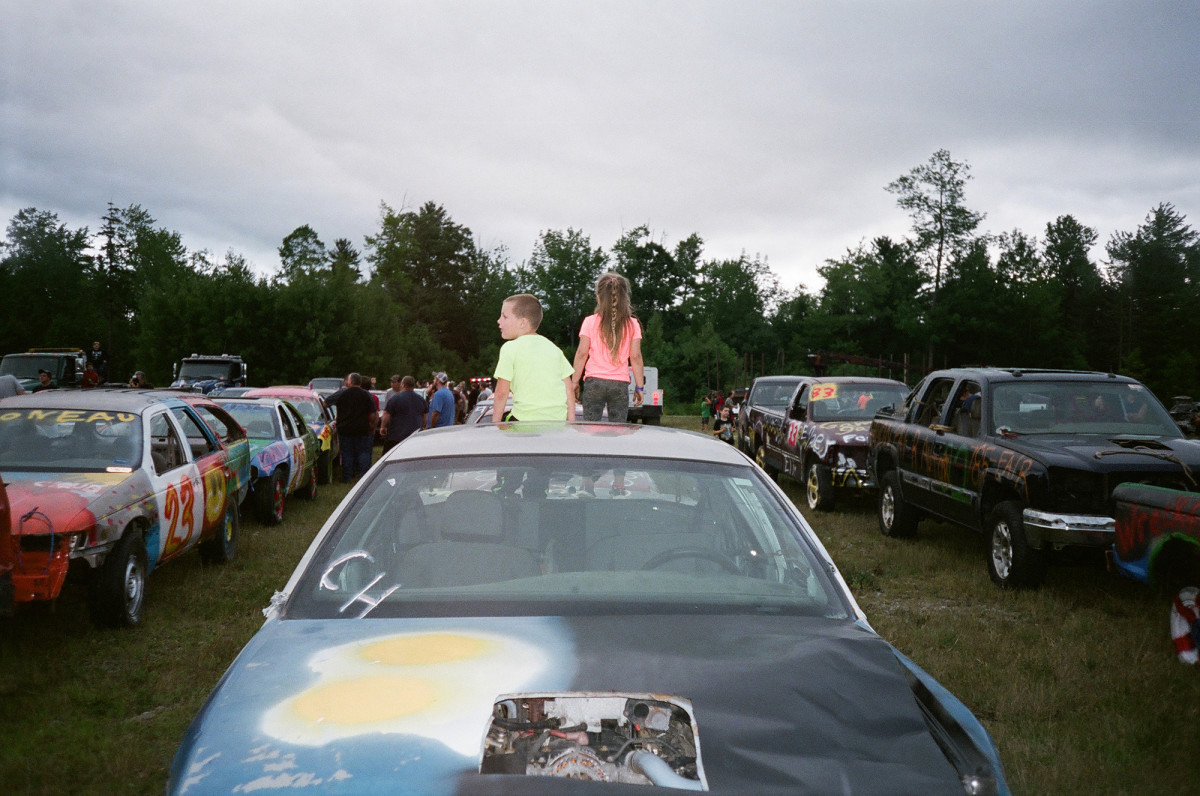
The low cloud cover and falling light makes everything gray and vaguely sinister. This looks like some post-apocalyptic line-up, a DIY Mad Max: Fury Road.
Werner stands near the front of the crowd. He’s holding a can of Moxie, a soda made in Maine that tastes like cough syrup and licorice got together and had a carbon dioxide-infused kid. He nervously taps his finger against the orange can. He and Shelley got here at 2 p.m. and checked out the other cars. They wandered around the truck beds full of tools and pulleys and ropes and nylon belts. All afternoon they heard the chains clanking, doors shutting, spray-paint cans shaking and engines revving. They could feel the muscles of these cars vibrate through the ground. The sounds mixed with the hum of a field in late summer: the clicks of crickets, the low, constant buzz of insects.
Maine in the summer is its own certain kind of magic. The light is different from anywhere else in the world up here. Clearer, almost. Brighter. The field smells like gasoline, sweet hay, fried food from the fair, cigarettes, spray paint, anticipation and the years of stale air fresheners that hang around these old cars. A going-back-to-school breeze, that sad wind that starts up towards the end of August, rustles the tall grass.
This evening feels like my childhood, like Madison’s, like her father’s. Everyone here knows this is fleeting, that tonight is what they’ll dream about in February as they pull on their fifth layer of Carhart jackets and trudge down their colorless driveways to dig their cars out of the snow.
The meeting ends and Leavitt hops into his truck. I climb into the bed of the pickup with the derby staff—firefighters and guys who are going to help him referee—and we lead the parade of cars down to the horse track that circles the arena where they’re going to die. About a thousand people have gathered by now, camping out on flatbeds they’ve pulled up to the ring and filling the tall, rickety, wooden stands where you can watch the horse races. Floodlights shine on the dirt arena even though it’s not dark yet. As the metal gladiators take a celebratory loop around the track, a roar goes up from the crowd. Werner sticks his hand out the Taurus’s window and gives a thumbs up.
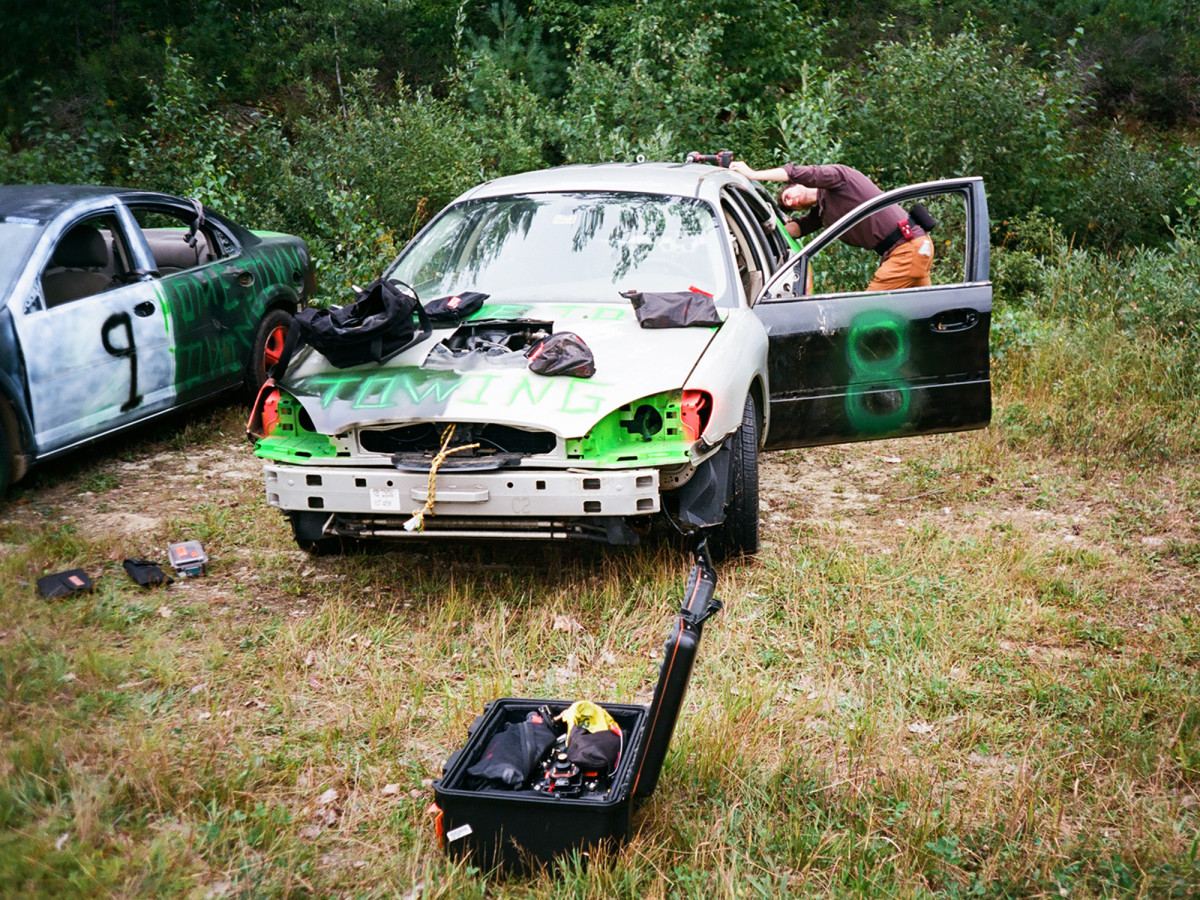
Eleven cars dance around each other in some terrible tango, kicking up so much mud that a clump lands in Madison’s plate of fried dough, which is sitting next to her on the bed of Leavitt’s tow truck 15 feet away from the action. The reflection of the sunset on the low clouds over the blinking neon lights of the fair is the color of her cotton candy. The air tastes like dirt.
Werner is in this heat. His Taurus—with the checks he painted and the black door that Madison sprayed—backs up as fast it can from across the ring and smashes into two other wagons that have their hoods locked around each other like giant jaws. Werner’s car pins them up against the cement blocks behind which firefighters crouch, hoses ready. I realize I’ve forgotten there are people driving these machines. They seem to be going at one another of their own volition, fully sentient vehicles.
“I want to run into the bathroom but I can’t miss the show,” Madison says. She has her hands up on her temples. Jacoby Jr., wearing a shirt with Danica Patrick’s face on it, jumps up and down next to her, and Liberty squirms beside her aunt. A tire blows as a car slams into the wall near us and everyone jumps. The crowd cheers and boos.
“Do you like watching this?” I ask Madison.
“Yeah, but it freaks me out really hard,” she says.
Ten of the cars aren’t moving. Werner’s is the only one still alive, and Leavitt blows an air horn to signal that the heat is over. Werner wills the Taurus to roll out of the arena—he’ll move on to the feature. The other cars are finished. Forklifts drive in and pick them up, drivers still inside, and carry them out. It takes about 30 minutes to clear the ring. A band, average age probably 65, plays hits from the ’60s, like “Louie Louie” and “Last Train to Clarksville,” but you can’t hear it over the beeping forklifts and the rumble of engines.
The next heat is ushered in, and the mayhem starts all over again. Fire shoots out from under the hood of a car decorated like a John Deere tractor. The fire department hops into the ring and puts it out. A car with No. 69 and a cardboard cutout of a Captain Morgan bottle strapped to the roof wins the last round.
It’s finally time for the main event.
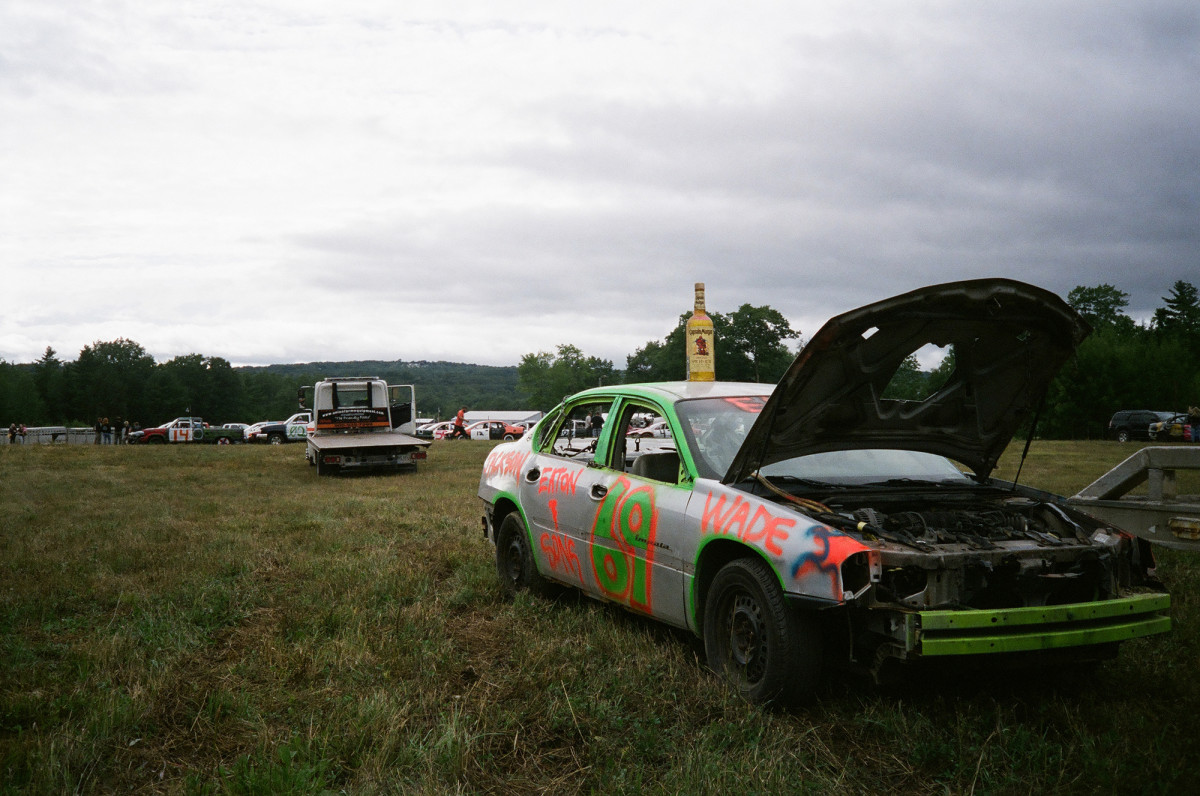
Werner limps his Taurus back into the ring along with the remaining cars that still work. They fire up the engines, an overwhelming sound, a country version of a NASCAR race. They begin smashing into each other again ruthlessly for the trophy. Drivers’ heads are whipping around inside the cars, their bodies are limp noodles. Shelley clutches her stomach as Werner takes a huge hit to his driver’s side from the Captain Morgan car. The air horn doesn’t go off because Leavitt rules it accidental, but Werner doesn’t move for a bit. Madison clutches her head and screams, “GO JOEY!” Everyone in the stands is on their feet, cheering on the cars.
As I wince at Werner’s pain and flinch at every hit, I wonder, as I did all those years ago, why anyone would do this. And then I remember the rush I felt when I smashed that window. And how animated Leavitt looked describing the surge of adrenaline that comes with that first hit. I watch three more cars collide, and then a fourth crush them all, barely missing a driver’s side door. Metal crumples and folds in on itself and the driver flies to the passenger’s side. He shakes his head and then lowers it, seeking revenge, and hits the other car back. I find myself wanting bigger crashes, higher flames, more showers of sparks.
And then I realize that I do understand. The demolition derby is a release. As Werner said in the garage yesterday, this is the one day a year people like Leavitt can destroy the machines they rely on for their livelihoods instead of having to fix them. Most of these drivers work with cars or boats. This deliberate wreckage is a holiday, a hall pass from being an adult, the only time they can act out the games they used to play in their fathers’ shops with their toy plastic cars. This is mandated mayhem. It’s fun. The pain is a side effect, a hangover. It can’t be helped. It’s worth it.
There’s ritual in the careful preparation of the cars. The demolition derby is a rite where people sacrifice what they have—what they go out of their way to buy just to wreck—to some god of destruction. Just like hunting, it’s flirting with death without (hopefully) dying yourself. It’s getting close to the edge without jumping off, which is when you feel—or appreciate being—most alive. They watched their fathers and mothers do it, and their children watch them do it. It’s tradition. And it’s in their backyard. Leavitt had the chance to leave. But he stayed, so he makes his own escape, a chance to thrill at the danger of doing something you’re never supposed to do.
“Maine is home,” he told me earlier. “And guys look forward to this one day all year.”
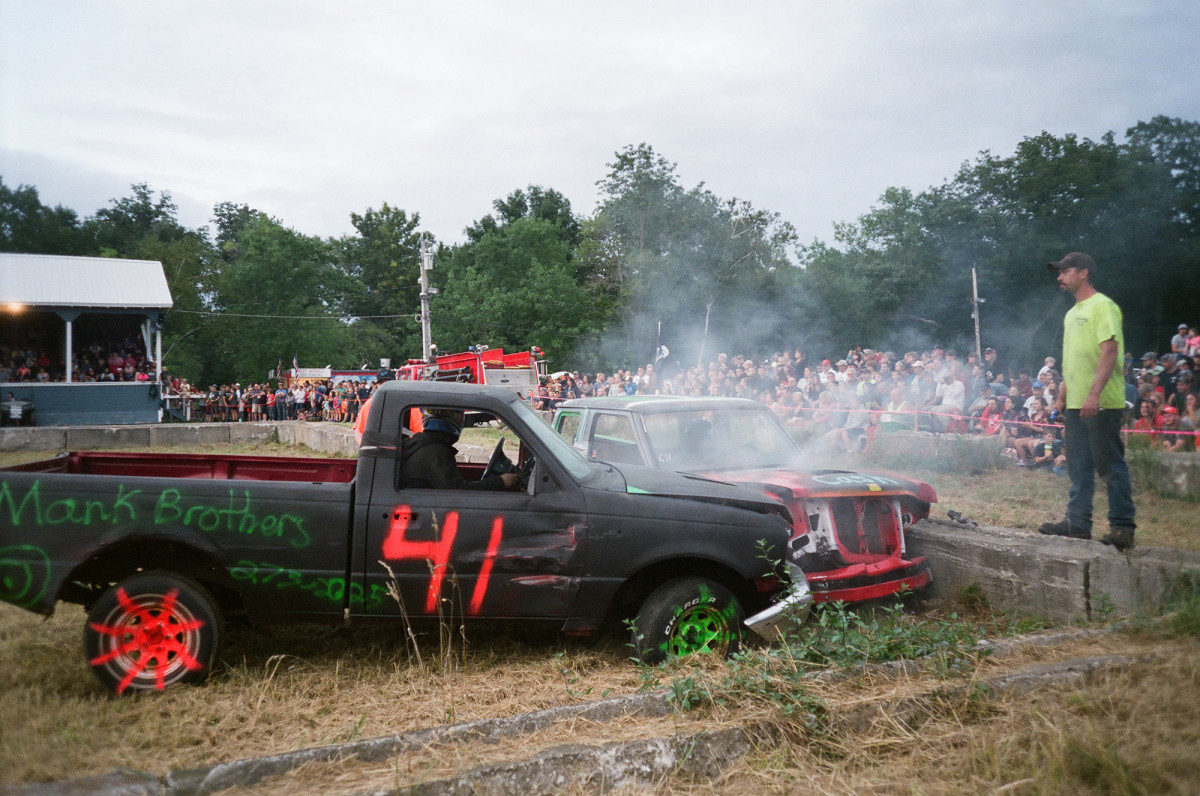
Werner’s Taurus is one of the two cars remaining that can still move. He can’t see out his front windshield and his arms are so sore from hanging onto the steering wheel that he thinks he may pass out. He rams the Captain Morgan car from behind and pins it against the wall. Smoke pours out of its hood and it doesn’t move. The front tires spin and nothing happens. It sputters out.
The air horn goes off.
Werner has won his first demo derby.
Leavitt sprints over to him and gives him a hug through the window. Werner takes off his helmet. He’s drenched in sweat, looking a little dazed, but grins his huge smile as Leavitt bends down and gives him the beer mug with a few hundred dollar bills and a few twenties inside, culled together from the $25 it took each driver to enter the competition. Everyone on Leavitt’s truck by the ring is screaming and cheering. Werner looks like he might cry as he drives his tired, beaten, but still-working machine out of the arena. Shelley hugs him for a long time when he finally gets out of the car. The trunk of the Taurus is basically gone, crushed in on itself like an accordion.
“If you saw this on the side of the road you’d be like, ‘Oh no!’” Shelley says. “But these guys do this on purpose.”
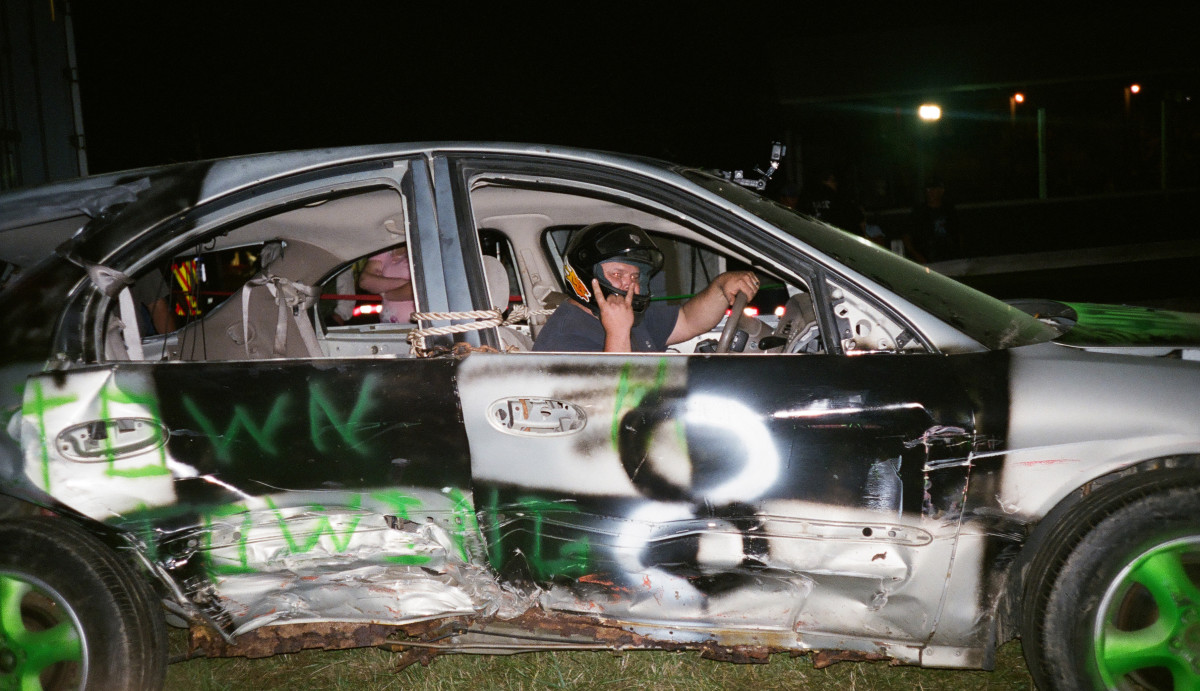
The cars littered around the lawn look like crumpled up pieces of paper, as though a giant was trying to hit the waste bin and missed.
“My dad says they look like s---,” Madison says, giggling at the bad word. She’s elated; she watched the whole thing, far less scared than she was in previous years. It’s past her bedtime but she’s not tired, and neither are her siblings. They run around the field, marveling at the twisted metal.
Leavitt comes over.
“He won because I built his car,” he says, nodding in Werner’s direction and winking.
The stands have emptied out by now. All that’s left is the smell of smoke and gas, the rumble of engines and the rattle of chains as guys start loading the scraps that were once cars onto truck beds.
Leavitt grabs a chain and throws it over his shoulder. His kids follow him. It’s time to go take some cars to the junkyard. And then tomorrow, it’s back to work. Until next year.
